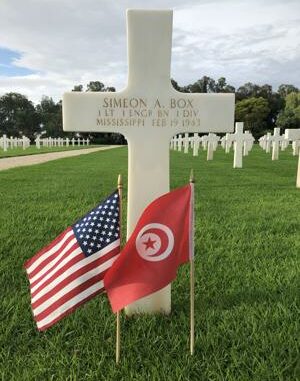
In March 2020, my wife and I drove off an ocean-going ferry that sailed from France to Tunisia. I had just been named superintendent of the North Africa American Cemetery, a stately military burial ground for 2,836 Americans who lost their lives during World War II, mostly in North Africa, and the memorial site for an additional 3,724 missing in action.
The cemetery was half a world away from my hometown of Big Cane in St. Landry Parish, but I discovered a familiar name among the graves now under my care: First Lieutenant Simeon Alexander “Alex” Box, the young U.S. Army officer whose name has graced the LSU Tigers baseball stadium for 80 years.
American military cemeteries were established overseas after World War I, when Americans died in such high numbers that the nation could not manage or afford to bring them all home. With their loved ones’ permission, nearly 30,000 of the fallen were laid to rest in permanent burial grounds near the battlefields where they gave their all. The American Battle Monuments Commission was formed as a federal agency in 1923 to serve as the caretaker of these sites.
In the wake of World War II, the practice of burying our fallen overseas continued, to ensure final places of honor for service members like Alex Box.
Before joining the military, Box was a standout athlete at LSU. Like millions of his generation, he answered the call to serve while in the prime of his life. In 1942, after playing outfield for the Tigers baseball team, he graduated with a degree in petroleum engineering and was commissioned into the Army. Within months of graduation, he deployed overseas as a platoon leader with 1st Engineer Combat Battalion, 1st Infantry Division.
On Nov. 9, 1942, near Arcole, Algeria, Box’s unit encountered a determined enemy position. According to the citation for the Distinguished Service Cross that he was later awarded, “Lieutenant Box, without hesitation, of his own volition and at the risk of his own life, volunteered to go forward.” He courageously entered the heavily armed town to take out key defenses before returning to his soldiers. Box survived that day. Unfortunately, four months later, a land mine detonation took his life in the Kasserine region of Tunisia.
During 23 years as an active-duty Marine, I saw up close the level of sacrifice we often ask of our service members, and I firmly believe there is no expiration on our nation’s promise to always care for their final places of rest. The American Battle Monuments Commission continues to proudly uphold this promise.
The centennial anniversary of the ABMC should be a point of reflection for our nation. Today, the ABMC administers 32 federal memorials and 26 overseas burial grounds, holding more than 100,000 graves. Regardless of the passage of time, the ABMC ensures each site remains a fitting tribute for our fallen service members.
The ABMC encourages every American to visit one of our sites. Those who cannot travel can explore our sites virtually through our website, watch a newly produced documentary on our first 100 years (available for free online), or research family connections to those we honor through our burial registry. We hope that everyone will take a moment to reflect on our mission and its significance to our fallen service members and their families.
Alex Box lost his life eight decades ago, yet he continues to rest in immaculately maintained grounds with tranquil tree-lined fountains, ornate mosaic battle maps and a chapel decorated with polished Italian marble and Moroccan cedar. Most significantly, he remains together with his comrades-in-arms.
After Alex Box lost his life, Brigadier General Theodore Roosevelt Jr., personally wrote a letter of condolence to his mother. The letter read, “the deeds and death of your son have gone to make up the spiritual background that is this country.” Such profound sacrifices should always be remembered.
Dan Hicks is a Marine Corps veteran from Louisiana who now serves with the American Battle Monuments Commission as superintendent of the North Africa American Cemetery and Memorial in Carthage, Tunisia.


Leave a Reply